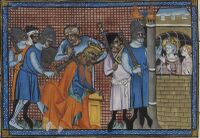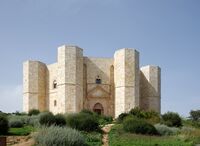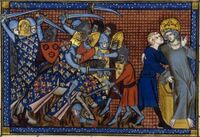1250
► | قرن 12 | << قرن 13 >> | قرن 14 | ◄
► | عقد 1220 | عقد 1230 | عقد 1240 | << عقد 1250 >> | عقد 1260 | عقد 1270 | عقد 1280 | ◄
► | ► | 1245 | 1246 | 1247 | 1248 | 1249 | << 1250 >> | 1251 | 1252 | 1253 | 1254 | 1255 | ◄ | ◄
تحويل 1-1-1250م الى هجري (وصلة خارجية) | تحويل 31-12-1250م الى هجري (وصلة خارجية) | ابحث في الموسوعة عن مواضيع متعلقة بسنة 1250
| ألفية: | الألفية 2 |
|---|---|
| قرون: | القرن 12 – القرن 13 – القرن 14 |
| عقود: | عقد 1220 عقد 1230 عقد 1240 – عقد 1250 – عقد 1260 عقد 1270 عقد 1280 |
| سنين: | 1247 1248 1249 – 1250 – 1251 1252 1253 |
| 1250 حسب الموضوع | |
| السياسة | |
| زعماء الدول – الدول ذات السيادة | |
| تصنيفا المواليد والوفيات | |
| المواليد – الوفيات | |
| تصنيفا التأسيسات والانحلالات | |
| التأسيسات – الانحلالات | |
| الفن والأدب | |
| 1250 في الشعر | |
| التقويم الگريگوري | 1250 MCCL |
| آب أوربه كونديتا | 2003 |
| التقويم الأرمني | 699 ԹՎ ՈՂԹ |
| التقويم الآشوري | 6000 |
| التقويم البهائي | −594 – −593 |
| التقويم البنغالي | 657 |
| التقويم الأمازيغي | 2200 |
| سنة العهد الإنگليزي | 34 Hen. 3 – 35 Hen. 3 |
| التقويم البوذي | 1794 |
| التقويم البورمي | 612 |
| التقويم البيزنطي | 6758–6759 |
| التقويم الصيني | 己酉年 (التراب الديك) 3946 أو 3886 — إلى — 庚戌年 (المعدن الكلب) 3947 أو 3887 |
| التقويم القبطي | 966–967 |
| التقويم الديسكوردي | 2416 |
| التقويم الإثيوپي | 1242–1243 |
| التقويم العبري | 5010–5011 |
| التقاويم الهندوسية | |
| - ڤيكرام سامڤات | 1306–1307 |
| - شاكا سامڤات | 1172–1173 |
| - كالي يوگا | 4351–4352 |
| تقويم الهولوسين | 11250 |
| تقويم الإگبو | 250–251 |
| التقويم الإيراني | 628–629 |
| التقويم الهجري | 647–648 |
| التقويم الياباني | Kenchō 2 (建長2年) |
| تقويم جوچى | N/A |
| التقويم اليوليوسي | 1250 MCCL |
| التقويم الكوري | 3583 |
| تقويم مينگوو | 662 قبل جمهورية الصين 民前662年 |
| التقويم الشمسي التايلندي | 1793 |
Year 1250 (MCCL) was a common year starting on Saturday (link will display the full calendar) of the Julian calendar.
أحداث
By place
World
- The world population is estimated at between 400 and 416 million individuals.
- World climate transitions from the Medieval Warm Period to the Little Ice Age.[1]
- Medieval music: The Notre Dame school of polyphony ends.
Europe
- February 2 – King Eric XI (Eriksson) dies and is succeeded by the 10-year-old Valdemar I, who is the eldest son of Birger jarl. He is elected as ruler of Sweden, and becomes the first Swedish king of the House of Folkung.
- April 30 – King Louis IX (the Saint) is released by his Egyptian captors after paying a ransom of one million dinars and turning over the city of Damietta.
- October 12 – A great storm shifts the mouth of the River Rother in England 12 miles (20 km) to the west; a battering series of strong storms significantly alters other coastal geography around Romney Marsh.
- December 13 – Emperor Frederick II dies, beginning the 23-year-long "Great Interregnum". Frederick is the last Holy Roman Emperor of the Hohenstaufen dynasty; after the interregnum, the empire passes to the Habsburgs.
- The Lombard League dissolves upon the death of its member states' nemesis, Frederick II, Holy Roman Emperor.
- King Afonso III (the Boulonnais) captures the Algarve from the Moors, thus completing the expulsion of the Moors from Portugal.
- Albertus Magnus isolates the element arsenic, as the 8th discovered metal. He also first uses the word "oriole" to describe a type of bird (most likely the golden oriole).
- The Rialto Bridge in Venice (in modern-day Italy) is converted from a pontoon bridge to a permanent, raised wooden structure.
- The Ponts Couverts fortified bridges of Strasbourg (in modern-day France) are completed.
- Vincent of Beauvais completes his proto-encyclopedic work Speculum Maius ("Greater mirror").
- The first of the Parlements of Ancien Régime France is established.
- Villard de Honnecourt draws the first known image of a sawmill.
- The first usage is made of the English word "cuckold", according to the Oxford English Dictionary.
Asia
- A kurultai is called by Batu Khan in Siberia as part of maneuverings which will elect Möngke Khan as khan of the Mongol Empire in 1251.
- Starting in this year and ending in 1275, the Muslim Shougeng Pu, likely a Persian or an Arab, serves as the Commissioner of Merchant Shipping for the Song dynasty Chinese seaport at Quanzhou, due to his effort in defeating pirates.[2]
أفريقيا

اغتيال طورانشاه الثاني بن أيوب

قلعة دل مونتى بنيت في 1250
- April 6 – Battle of Fariskur: Louis IX (the Saint) is captured by Baibars' Mamluk army while he is in Egypt conducting the Seventh Crusade; he later has to ransom himself.
- May 2 – Al-Muazzam Turanshah, Ayyubid ruler of Egypt, is murdered, ending effective Ayyubid Dynasty rule in the country. He is briefly succeeded by his widow, Sultana Shajar al-Durr.[3]
- July 21 – Aybak becomes ruler of Egypt, beginning the Bahri Dynasty of the Mamluk Sultanate. After 5 days he stands down and the 6-year-old Al-Ashraf Musa is proclaimed sultan nominally.[3]
- The Welayta state is founded in modern-day Ethiopia.
- In Tunis, a popular rebellion against newly arrived, wealthy and influential Andalusian refugees breaks out, and is violently put down.[4]
Oceania
- Samoa frees itself from Tongan rule, which begins the Malietoa dynasty in Samoa (تاريخ تقريبي).
By topic
Markets
- The Flemish town of Douai emits the first recorded redeemable annuities in medieval Europe, confirming a trend of consolidation of local public debt started in 1218, in Rheims.[5]
- The Sienese bankers belonging to the firm known as the Gran Tavola, under the steering of the Bonsignori Brothers, become the main financiers of the Papacy.[6]
مواليد
- April 8 – John Tristan, son of Louis IX (ت. 1270)
- Adolf II of Waldeck, prince-bishop of Liège (ت. 1302)
- Agnes of Baden, German noblewoman (ت. 1295)
- Albert II of Saxony, German nobleman (ت. 1298)
- Albert III, German nobleman and knight (ت. 1300)
- Albertus de Chiavari, Italian Master General (ت. 1300)
- Allamah al-Hilli, Persian Shia theologian (ت. 1325)
- Asher ben Jehiel, German Jewish rabbi (ت. 1327)
- Beatrice of Savoy, Swiss noblewoman (ت. 1292)
- Bonconte I da Montefeltro, Italian general (ت. 1289)
- Diether of Nassau, archbishop of Trier (ت. 1307)
- Dmitry of Pereslavl, Kievan Grand Prince (ت. 1294)
- Esclaramunda of Foix, queen of Majorca (ت. 1315)
- Fra Dolcino, Italian priest and reformist (ت. 1307)
- Grigorije II of Ras, Serbian monk-scribe (ت. 1321)
- Guido Cavalcanti, Italian poet and writer (ت. 1300)
- Jeanne de Montfort, Swiss noblewoman (ت. 1300)
- John IV (Laskaris), emperor of Nicaea (ت. 1305)
- Konrad II of Masovia, Polish nobleman (ت. 1294)
- Margaret of Burgundy, queen of Sicily (ت. 1308)
- Matteo I Visconti, Italian imperial vicar (ت. 1322)
- Mordechai ben Hillel, German scholar (ت. 1298)
- Nijō Tameyo, Japanese official and poet (ت. 1338)
- Niklot I, German nobleman and knight (ت. 1323)
- Rhys ap Maredudd, Welsh nobleman (ت. 1292)
- Robert II, French nobleman and knight (ت. 1302)
- Sancho of Aragon, Spanish archbishop (ت. 1275)
- Theodoric of Freiberg, German physicist (ت. 1311)
- Zavis of Falkenstein, German nobleman (ت. 1290)
وفيات
- February 2 – Eric XI (Eriksson), king of Sweden (و. 1216)
- February 6 – Geoffrey VI, French nobleman and knight
- February 8
- Andrew III, French nobleman and knight (و. 1200)
- Fakhr ad-Din, Egyptian ruler and military leader
- Robert I (the Good), French nobleman (و. 1216)
- William Longespée (the Younger), English knight
- February 11 – Jean de Ronay, French Grand Master
- March 29 – Ludolph of Ratzeburg, German bishop
- April 6
- Guillaume de Sonnac, French Grand Master
- Hugh XI of Lusignan, French nobleman (و. 1221)
- May 2 – Al-Muazzam Turanshah, Ayyubid ruler of Egypt[3]
- May 21 – Humbert V, French nobleman and knight (و. 1198)
- May 26 – Peter I (Mauclerc), French nobleman (و. 1187)
- May 27 – Raniero Capocci, Italian priest and cardinal
- June 7 – Vitslav I, Danish nobleman and knight (و. 1180)
- June 18 – Theresa of Portugal, queen of León (و. 1176)
- August 10 – Eric IV (Ploughpenny), king of Denmark
- October 4 – Herman VI, German nobleman and knight
- October 12 – Richard Wendene, English bishop (و. 1219)
- December 13 – Frederick II, Holy Roman Emperor (و. 1194)[7]
- Alice of Schaerbeek, Flemish Cistercian lay sister (و. 1220)
- Gilbertus Anglicus, English physician and writer (و. 1180)
- Julian of Speyer, German Franciscan composer and poet
- Leonardo of Pisa, Italian mathematician and writer (و. 1170)
- Romée de Villeneuve, French nobleman and seneschal
- Shihab al-Din Muhammad al-Nasawi, Persian biographer
- Walter of Serviliano, Italian Benedictine hermit and abbot
- Yang Miaozhen, Chinese female military leader (و. 1193)
References
- ^ Le Roy Ladurie, Emmanuel; Bray, Barbara (1971). Times of Feast, Times of Famine: a History of Climate Since the Year 1000. Garden City, NY: Doubleday. ISBN 0-374-52122-0. OCLC 164590.
- ^ According to a monograph on the maritime economy of the Song dynasty written by Jitsuzo Kuwabara (桑原騭藏, 1870–1931).
- ^ أ ب ت Humphreys, R. Stephen (1977). From Saladin to the Mongols: The Ayyubids of Damascus 1193-1260. Albany: State University of New York Press. ISBN 9780873952637.
- ^ de Epalza, Miguel (1999). Negotiating cultures: bilingual surrender treaties in Muslim-Crusader Spain under James the Conqueror. Brill. p. 106. ISBN 90-04-11244-8.
- ^ Zuijderduijn, Jaco (2009). Medieval Capital Markets. Markets for renten, state formation and private investment in Holland (1300-1550). Leiden/Boston: Brill. ISBN 978-90-04-17565-5.
- ^ Catoni, Giuliano. "Bonsignori". Dizionario Biografico degli Italiani. Retrieved 20 December 2011.
- ^ "Frederick II | Biography, Accomplishments, & Facts". Encyclopedia Britannica (in الإنجليزية). Retrieved 29 September 2020.
This article may include material from Wikimedia licensed under CC BY-SA 4.0. Please comply with the license terms.
